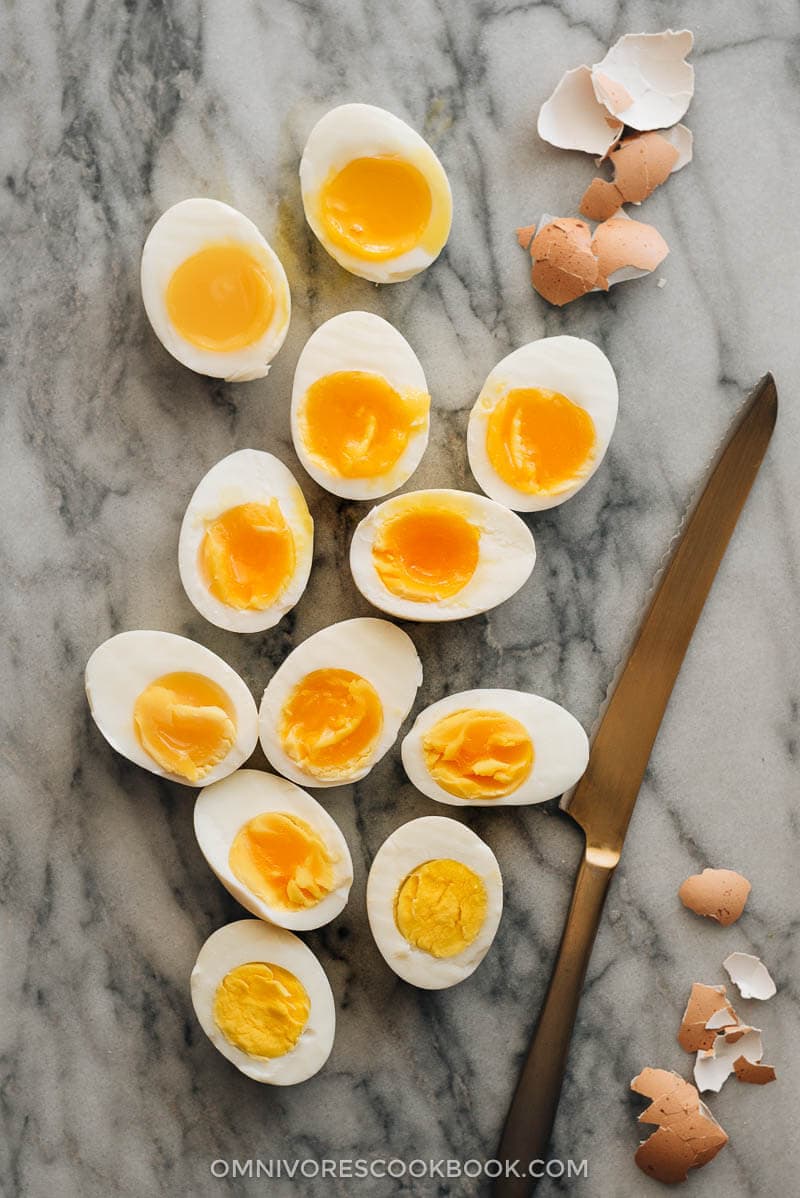
I’ve been using my Instant Pot for quite a while. Throughout that time, I’d heard so much fuss about Instant Pot eggs but didn’t understand what the big deal was. Until I tried it myself! My first reaction was OMG – these are the most perfect soft-boiled eggs ever!
Back in China I enjoyed boiled eggs for breakfast. The cooking became such a hassle after I moved to the US. First of all, the electric stove takes forever to boil a pot of water. Plus, since the heat is harder to control, I can rarely get the tender texture I prefer. All these problems are solved by using an Instant Pot!
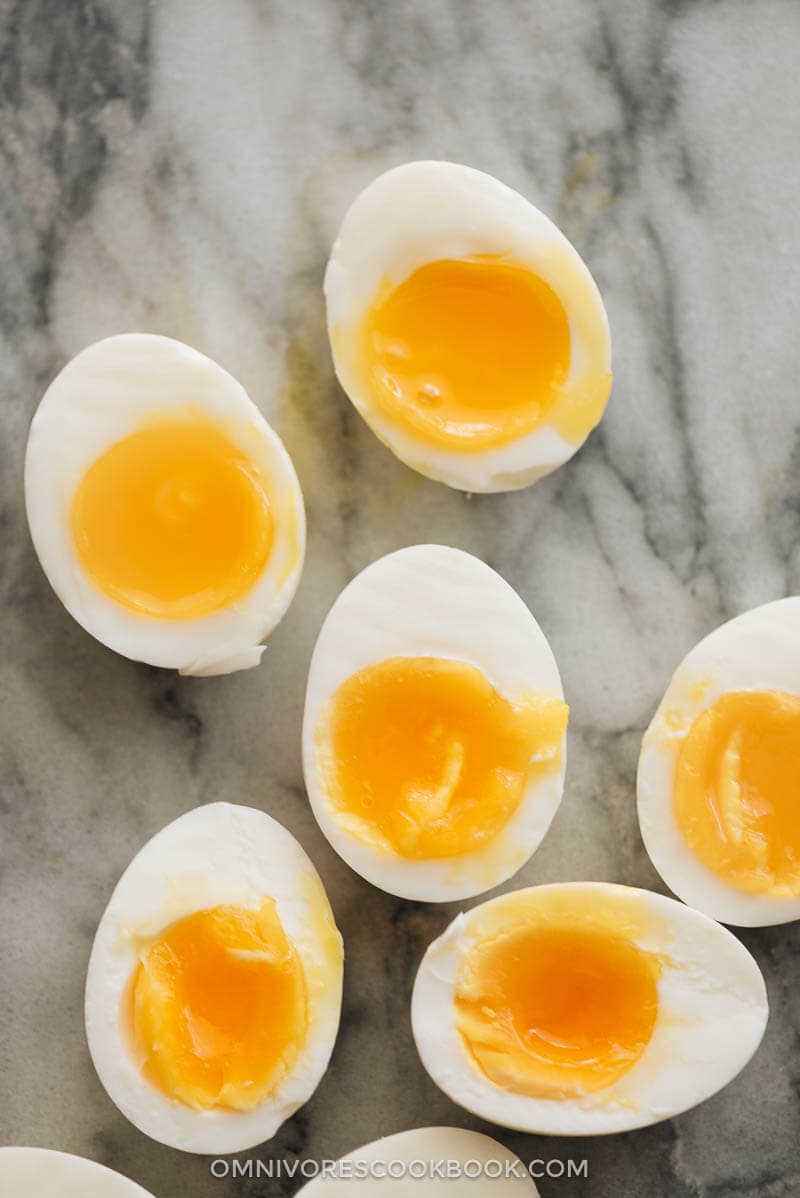
Why you want to make eggs in an Instant Pot
- The results are very consistent. If you’ve been boiling eggs on the stovetop, you probably need a bit of luck to get the desired texture. In an Instant Pot, you can get perfect hard-boiled or soft-boiled eggs every single time.
- The cooking time is super short, plus you don’t need to monitor your pot. The perfect soft-boiled eggs take as little as 2 minutes to cook under pressure, with 5 minutes to add the pressure before that.
- The eggs are very easy to peel.
- You can make a single egg or as many as a dozen eggs in one batch.
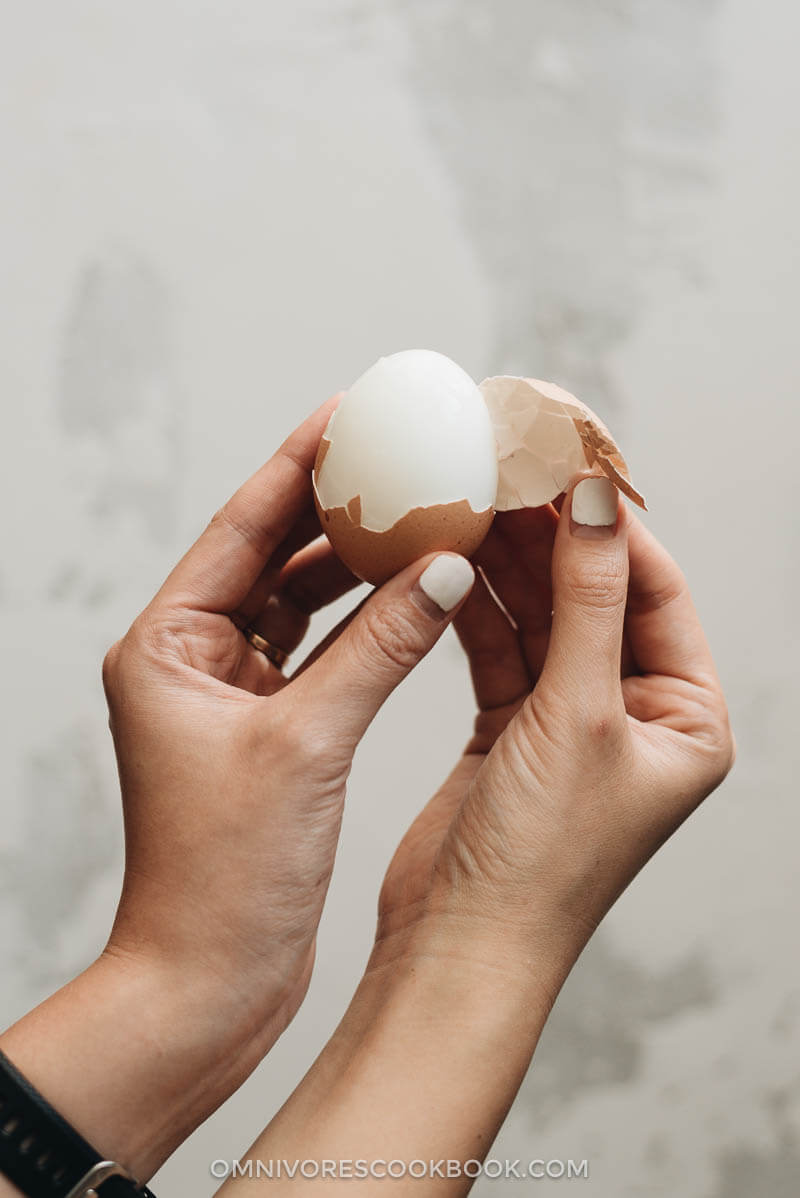
How to make the perfect eggs in an Instant Pot (Pressure Cooker)
1. Equipment you need
You will need:
- Instant Pot (or a traditional stovetop pressure cooker)
- The trivet that comes with the Instant Pot
- A pair of tongs (to remove the eggs once done)
2. How many eggs you can make?
The answer is: as many as you want, but you need to make sure the eggs don’t fall into the water. You can even stack the eggs in two layers, so you can make more at one time.
3. How it works.
You will need to pour one cup of water into the Instant Pot. Then place the trivet inside the pot, then place the eggs on top of the trivet. During cooking, the eggs will be steamed at high pressure. Once done, move the eggs into an ice bath for a couple of minutes to cool. It yields very consistent results, is quick to cook in batches, and the eggs are super easy to peel.
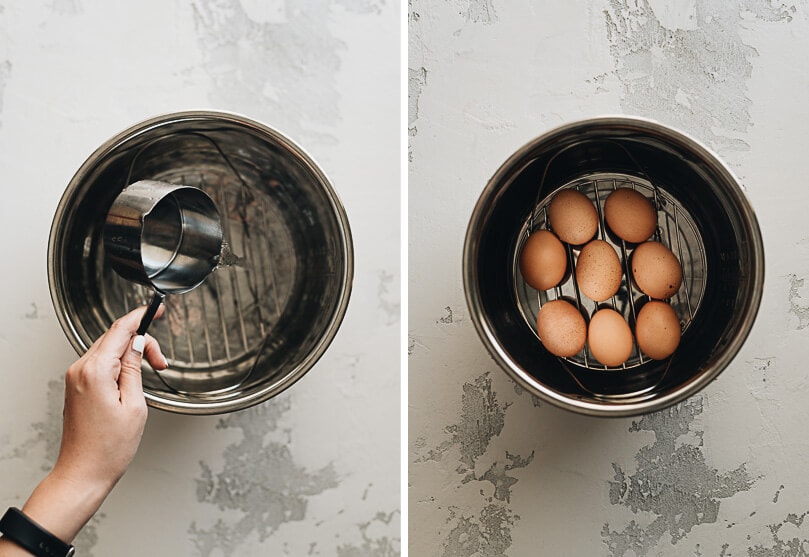
4. Cooking time
I used a 6-quart Instant Pot to make 6 large eggs. I’ve also tried cooking between 2 and 10 eggs at a time. The cooking time stays the same, regardless of quantity.
Soft-boiled eggs: 3 to 4 minutes at high pressure. My favorite cooking time is 3 minutes, at which I get perfectly cooked egg whites with runny yolks.
Medium-boiled eggs: 5 to 6 minutes at high pressure, where a portion of each egg will harden and the rest of it stays very tender and creamy.
Hard-boiled eggs: 8 to 10 minutes at high pressure. Personally, I like the results after 8 minutes, where the egg yolk is fully cooked but still soft. At the 10-minute mark, the egg yolk will be cooked further but won’t taste too dry. The 10-minute eggs are perfect for deviled eggs.
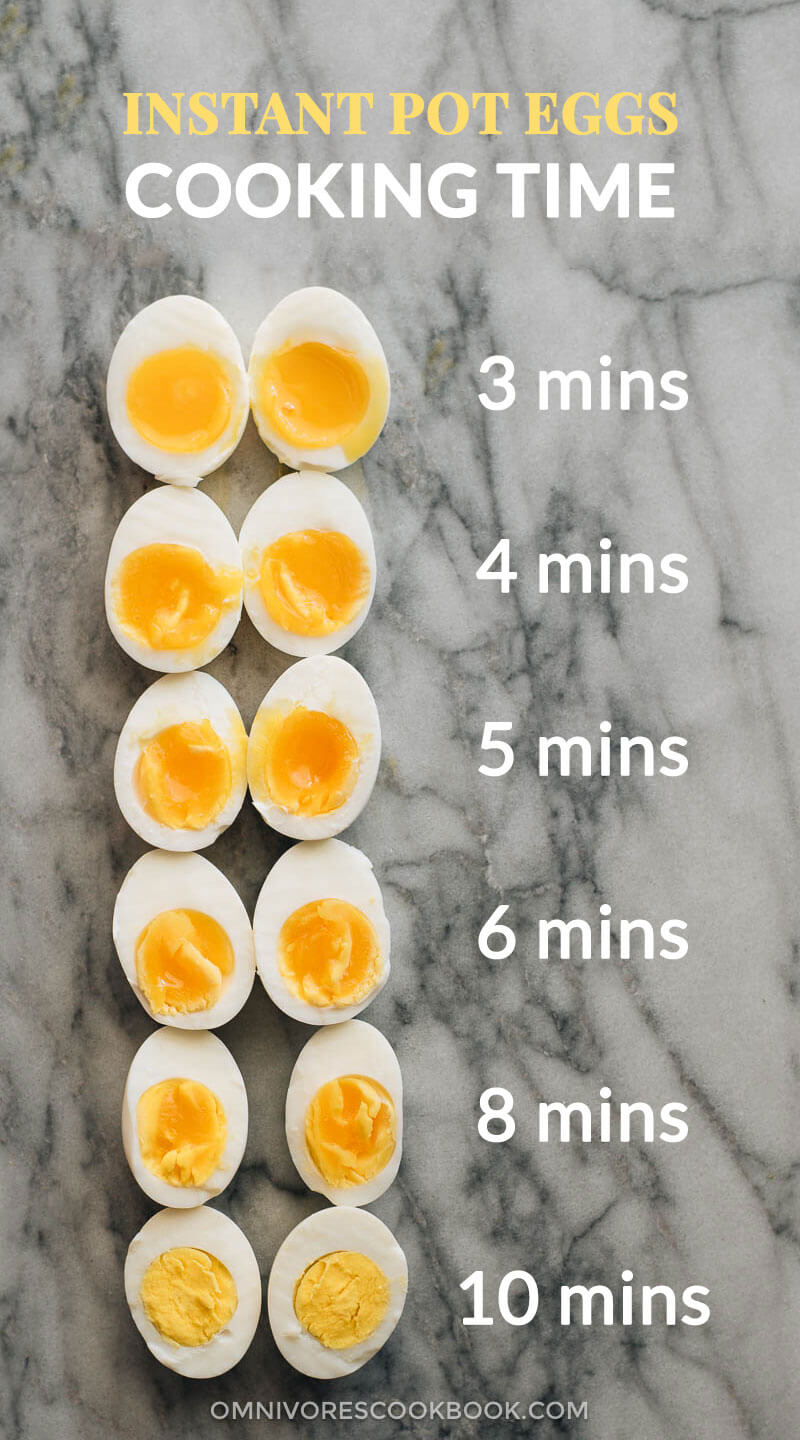
Important things to note
1. Always use fast release
Always use fast release immediately after the eggs are done cooking under pressure. If you leave the eggs in the pot, they will continue to cook in the residual heat and your eggs will be overcooked.
To safely release the pressure, use a long spatula or a pair of tongs to move the valve to the release side. Do make sure your hand is not over the valve while doing this.
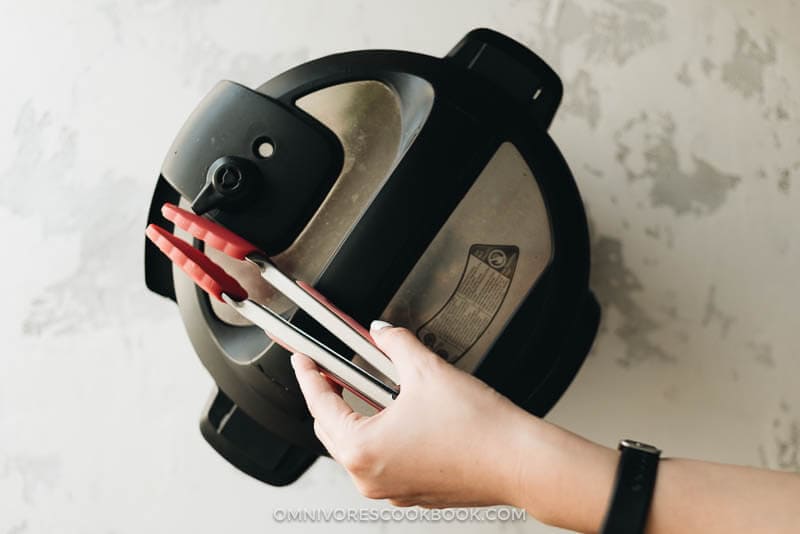
2. Does egg size matter?
The answer is: yes. This recipe assumes you’re using large eggs. If you’re using medium eggs, reduce the cooking time by 1 minute. If you’re using extra large eggs, add 1 minute.
3. Why use an ice bath?
The ice bath will cool the eggs immediately so they won’t keep cooking in the residual heat. Plus, the eggs will be “shocked”, which makes them very easy to peel.
What if you don’t have ice? No problem at all! Simply run the eggs under cold tap water for 1 to 2 minutes, until they are cooled enough to peel. The eggs might be slightly easier to peel using the ice bath method, but the tap water method is a lazy one that I use all the time.
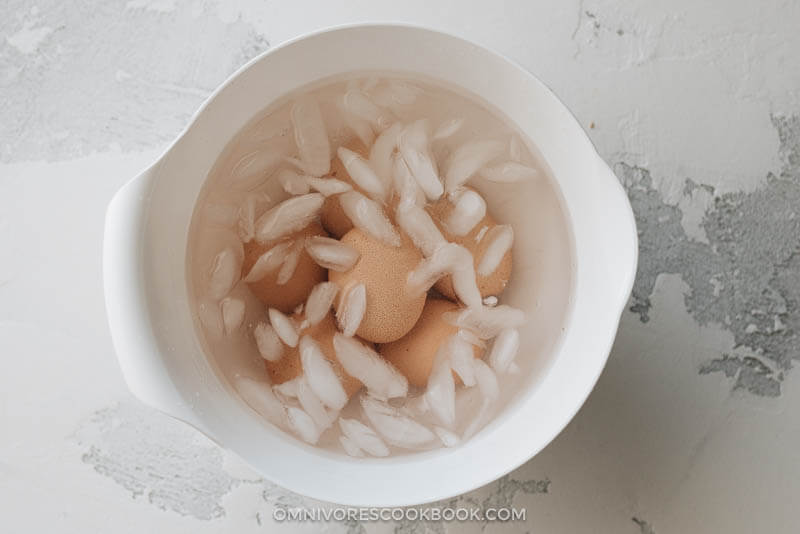
Instant Pot eggs troubleshooting
Why did my eggs come out too hard or too soft?
This is the most common question. Remember, many factors affect the cooking time needed for perfect eggs. For example, high elevation, the size of the eggs, the temperature of the eggs, quantity of eggs, the model of your Instant Pot, etc.
I’ve seem many recipes for Instant Pot eggs, but none of them share the exact same cooking time.
In general, if you’ve followed the recipe but did not achieve your desired results, simply add 1 to 2 minutes to get a more cooked egg, or decrease by 1 to 2 minutes to get a softer egg. Test until you achieve the texture you prefer.
Why did my eggs crack during cooking?
Make sure you place the eggs on the steaming rack without letting them touch the water. If you put the eggs directly into the water or partially in the water, the eggs might jostle during cooking and crack open. Also, stacking too many eggs can also cause cracking. If you want to cook more eggs in one batch and minimize cracking, investing in an egg rack might be a good idea.
To tell you the truth, if you are as big a fan of boiled eggs as I am, I would invest in an Instant Pot, if only just to make perfect eggs so easily! They are that good and that convenient. And of course, there are so many other great, easy, and delicious dishes you can make using an Instant Pot.
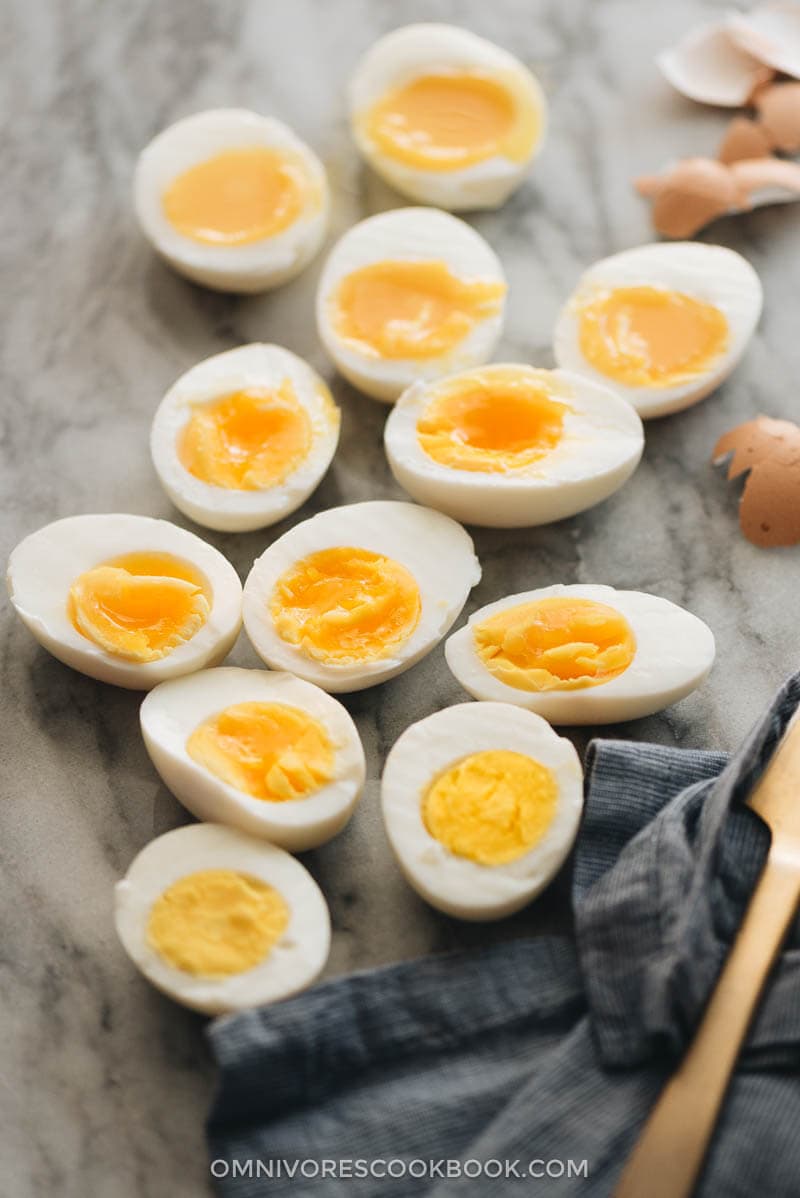
More Instant Pot recipes
- Instant Pot Curry Beef Stew
- Instant Pot Chicken Congee
- Asian Instant Pot Chicken Noodle Soup
- Pressure Cooker Chicken Stock
If you give this recipe a try, let us know! Leave a comment, rate it (once you’ve tried it), and take a picture and tag it @omnivorescookbook on Instagram! I’d love to see what you come up with.
Chinese Cooking Made Easy
Are you new to this website? This free email series is a great place to start. I’ll walk you through a few of my most popular recipes and show you how and why they work. You’ll quickly start to cook better Chinese food in your own kitchen.
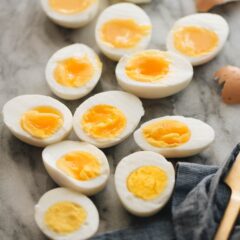
Instant Pot Eggs (Perfect Hard-Boiled & Soft-Boiled Eggs)
Ingredients
- 2 to 14 large eggs
- 1 cup water
Equipment
- Steaming rack that comes with the Instant Pot
- Pair of tongs
Instructions
- Place the steaming rack (or the egg rack) in your Instant Pot and pour 1 cup water into the bottom of the pot. Place the eggs on the rack in a way that most of them don’t touch the sides of the pot.
- Close the lid and seal the valve. Press the “manual” button, set the pressure to "high", and set the timer to get the preferred results: 3 minutes for perfect soft-boiled eggs, 5 minutes for medium eggs, and 8 minutes for hard-boiled eggs. To get an idea of the egg yolk texture, check out the infographic in the blog post above.
- Prepare an ice bath by combining a few handfuls of ice and some water in a big bowl.
- When the cooking is done and you hear the beep, immediately use a pair of tongs to turn the valve to release the pressure. Be careful not to put your hands or face near the valve, so the steam won’t burn you. The release will be quick, less than 1 minute.
- Once the pressure has released, you will hear a small click. Immediately open the lid and use a pair of tongs to transfer the eggs into the ice bath. Let cool for 1 to 2 minutes, or until the eggs are cooled enough to handle.
- Peels the eggs and enjoy! You can store the eggs in an airtight container in the fridge for 3 to 4 days.
Notes
Nutrition

Did you make this recipe?
I’d love to hear how it turned out for you! Please take a moment to leave a 5-star rating ⭐️ and share your thoughts in the comments further down the page. It really helps others discover the recipe too.

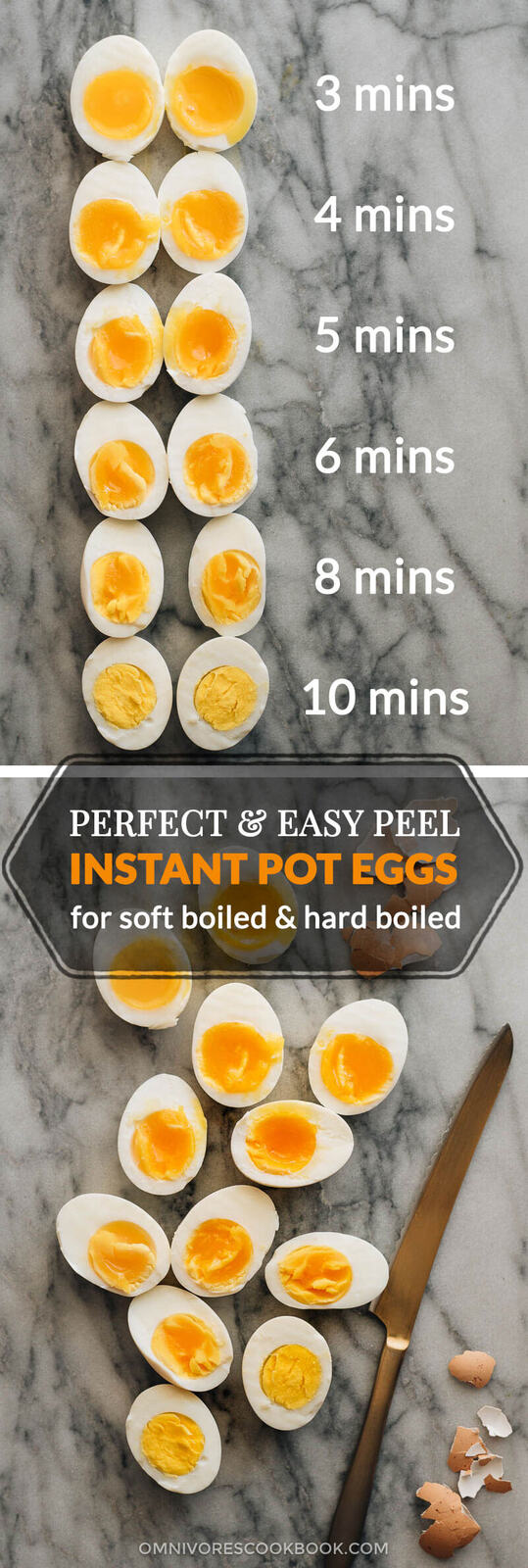
Ving
Thank you for the recipe. The use of an instant pot for boiling eggs is fantastic. You are able to EASILY peel the eggs afterwards with no blemishes on the eggs.
A.B. Bailey
I frequently make deviled eggs for family gatherings. I use my 6 qt Instant Pot and the 5-5-5 method to hardboil the eggs, but they always turn out with the dreaded greenish gray coating on the yolk. I recently stumbled on a post on Reddit that included a link to your method for boiling eggs in the Instant Pot. I tried your method tonight and my eggs turned out PERFECT! Thank you for publishing your method. It really works!
Michelle
Excellent recipe for easy-peel, no fuss boiled eggs. Thank-you!
Question – What is Chinkiang vinegar? Is it similar to Balsamic?
Maggie Zhu
It is a type of black vinegar that is commonly used in Chinese cooking. You can read a bit more about it here: https://omnivorescookbook.com/chinkiang-vinegar/
For replacement, it’s possible to use English-style malt vinegar or Japanese rice vinegar. Balsamic is not a great substitute because it’s too fruity and sweet.
Flos
Hi,
Are you using eggs straight from the fridge, or room temperature eggs? Thanks!
Maggie Zhu
I used eggs straight from the fridge in this recipe.